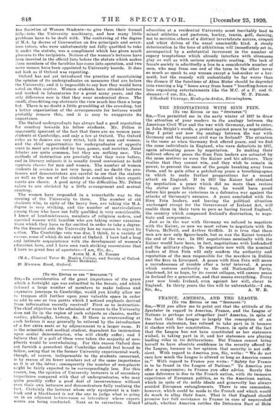THE NEGOTIATIONS WITH SINN FEIN. tTo THE EDITOR OP rue.SPECTITOg."1
Sig,—You permitted me in the early winter of 1917 to draw the attention of your readers to the analogy between the American Civil War and the war with Germany, and to enter, in John Bright's overdo, a protest against peace by negotiation. May I point out now the analogy between the war with Germany and the present civil war in Ireland? The situation is the tame as when Germany first offered peace, and we find the same individuals in England, who were defeatists in 1917, again advocating peace by negotiation. In making their indirect offers of peace the Sing Fein leaders are actuated by the same motives as were tho Kaiser and his advisers. They realize that they cannot win, and they wish to remain in power, to prevent the mass of the people breaking away from them, and to gain after a patched-up peace a breathing-space in which to make further preparations for a second attack on England. If in 1917 the Kaiser lead obtained by negotiation a peace which did no more than restore the status quo before the war, he would have posed before his people as victorious in a defensive war against the attacks of Germany's enemies. A peace concluded with the Sinn Fein leaders, and leaving the political situation unchanged except for the Government of Ireland Act, will enable them in their turn to pose as having forced England, the country which compassed Ireland's destruction, to nego- tiate and compromise.
Just as in the over with Germany we refused to negotiate with the Kaiser, so now we must refuse to negotiate with Do Valera, McNeill, and Arthur Griffith. It is true that these men are now only figure-heads, but so was the Kaieer towards the end of the war. In 1917 negotiations nominally with the Kaiser would have been, in fact, negotiations with Ludendorff and the military clique. To negotiate now with the nominal leaders of Sinn Fein will only confirm the authority and reputation of the men responsible for the murders in Dublin and the fires in Liverpool. A peace with Sinn Fein will mean a recrudescence of trouble after a brief interval. A peace which restores authority to the old Nationalist Party, chastened, let us hope, by its recent collapse, will ensure peace in Ireland for a generation, and that means everything. Every year now binds Ireland, even against her will, closer to England. In thirty years the ties will be unbreakable. —I am,


































 Previous page
Previous page